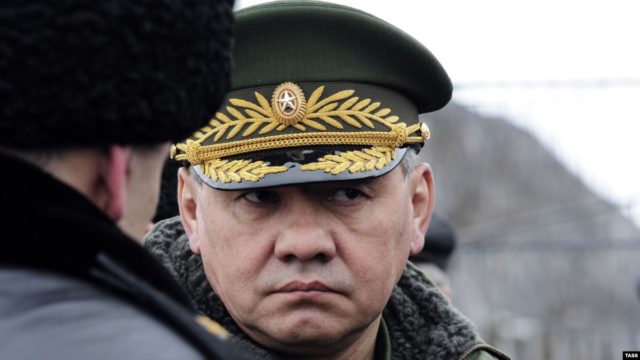
Russia’s Defense Minister Sergei Shoigu Survives Government Reshuffle
Publication: Eurasia Daily Monitor Volume: 17 Issue: 15
By:

Russia’s long-serving minister of defense, Army General Sergei Shoigu, recently survived the government reshuffle that accompanied President Vladimir Putin’s decision to change the constitution of the Russian Federation (see EDM, January 16). In many ways, Shoigu’s survival in the new cabinet came as little surprise to those following Russian politics, since he has a lengthy established friendship with the president and is widely recognized as part of Putin’s inner circle. However, it is worth noting the internal defense dynamics that have helped retain Shoigu as defense minister. These relate mainly to his successes in steering the reforms he inherited from his predecessor, Anatoly Serdyukov; some critical interactions with other defense policy personalities; as well his vision for the Armed Forces, which is closely tied to Putin’s aspirations (Rambler.ru, January 21).
In 2008, Putin left the presidency in accordance with the country’s constitution; yet, he found a way to effectively stay in power by moving to the office of prime minister while his close colleague Dmitry Medvedev (temporarily) assumed the presidency. Amidst this critical point in Russia’s post-Soviet development, Moscow’s political leadership launched major reforms of the Armed Forces, heavily motivated by the disappointing showing of the Russian military during the August 2008 war with Georgia. The process was guided by the then–defense minister Anatoly Serdyukov. However, by November 2012, with allegations of corruption swirling around Serdyukov, Putin chose to replace him by appointing Sergei Shoigu. The latter was seen as a “safe pair of hands,” having secured a reputation of a political survivor and a shrewd problem solver while leading the Ministry of Emergency Situations (see EDM, November 7, 2012).
Putin’s retention of Shoigu in his current post, last month, is rooted mainly in the army general’s success as Russia’s longest-serving defense ministry head since the collapse of the Soviet Union as well as in his interactions with key personalities. A vitally important element in Shoigu’s success as defense minister is his solid interaction with the chief of the General Staff, Army General Valery Gerasimov. In an assessment of Shoigu’s survival in his post, Colonel (ret.) Viktor Baranets, a military columnist for Komsomolskaya Pravda, sets out a number of additional reasons. Under Shoigu, the Russian Armed Forces have greatly improved thanks to the ongoing reforms and because they have benefited from the experience of the operations in Syria in support of Bashar al-Assad’s regime. But Baranets also highlights one important though frequently underestimated issue: Shoigu’s effective working relationship with Deputy Prime Minister Yury Borisov, responsible for overseeing the defense and space industry. Like the Russian defense minister, Borisov has held on to his position in the new government. Interestingly, the Komsomolskaya Pravda writer makes no reference to Russia’s ongoing conflict in Ukraine, which began in 2014 (Voenno-Promyshlennyi Kurier, January 28).
Baranets argues that, unlike Serdyukov, Shoigu established an “excellent interaction” between the defense ministry and the defense industry, and this has advanced still further since Borisov was appointed two years ago to his post as deputy prime minister for the defense and space industry. The military analyst asserts, “When the former deputy defense minister [Borisov] began to oversee the defense industry as deputy prime minister, there was a successful connection,” highlighting the key link in this Shoigu-Borisov defense tandem. Baranets adds that the outcome of this partnership can be seen in the scale of the military modernization: “The tandem that I mentioned tightly holds on to the reins of military reform, which in many respects determines the quality of the armed forces that we receive. Recall that when Sergei Shoigu came to the Ministry of Defense, we had only 10–15 percent of new weapons. And today, we have reached 70 percent in terms of this indicator” (Voenno-Promyshlennyi Kurier, January 28).
Russian media coverage of Borisov’s reappointment to his post overseeing the defense and space industry stresses his success in this role, the absence of complaints against him, and his good relations with Shoigu. These reports also note that Borisov was tasked with diversifying the defense sector. The new prime minister, Mikhail Mishustin, has stated that the further development of defense manufacturers will be a key priority of his cabinet (Lenta.ru, Dailystorm.ru, January 21).
On February 1, Deputy Prime Minister Borisov held a video conference with Energy Minister Alexander Novak and Pavel Livinsky, the director general of the power company Rosseti Group. Their discussion centered around the development of the national energy grid. Its purpose was to examine aspects of the latest domestic software and equipment used in the energy grid as part of the process of implementing the government’s “Digital Transformation 2030” concept. Livinsky noted that the pilot projects implemented by Rosseti confirm the benefits expected from the introduction of digital technologies. Importantly, those are based on the development of domestic enterprises, including the defense industry complex: “We are well aware that the successful implementation of the digital transformation project requires accelerated development of the domestic component base, [as well as] the creation of competitive industries and centers of digital competence,” Livinsky said (Rambler.ru, February 1). Borisov’s involvement here not only confirms ongoing interest in digitizing the Russian Armed Forces but also underscores the extent to which Moscow stresses developing a synergy between government departments and industry (Dailystorm.ru, January 21).
Shoigu’s survival in office relies as much on his political patronage as on evidence of success or advances in the military transformation. Yet, unlike previous defense ministers, he has built key networks and facilitators for that very transformation. Those vital implementers and supporters are spread across the power ministries and, as Baranets highlighted, are further enabled by the unprecedented coordination between the defense ministry and the defense industry, as exemplified in the Shoigu-Borisov tandem.



